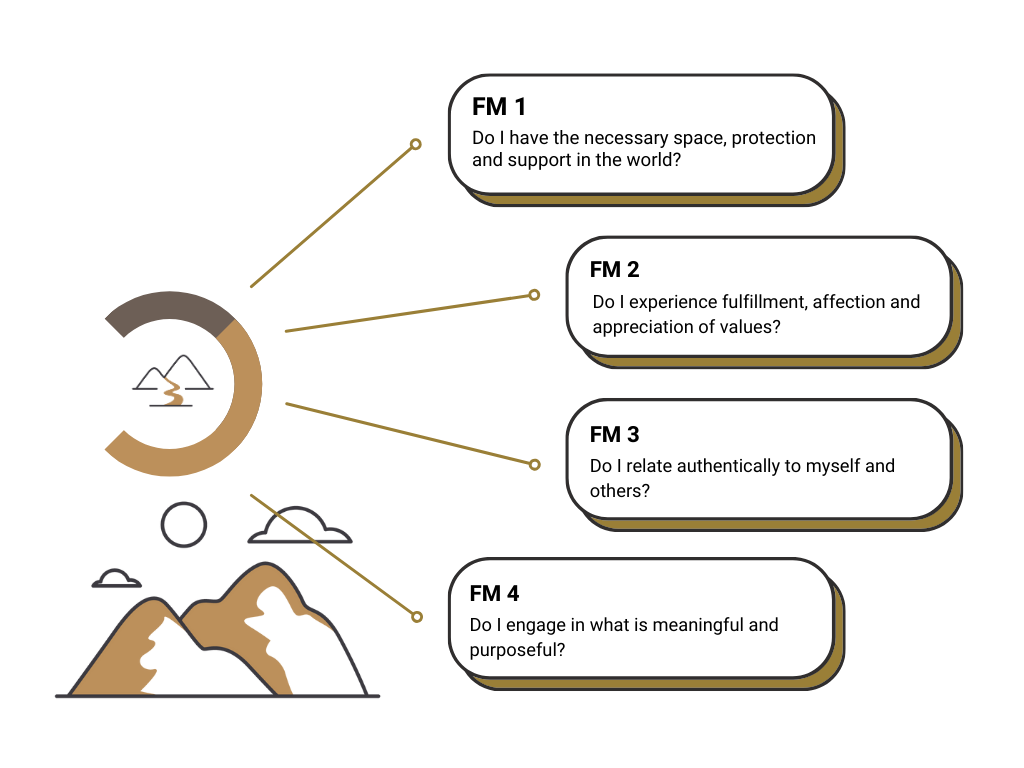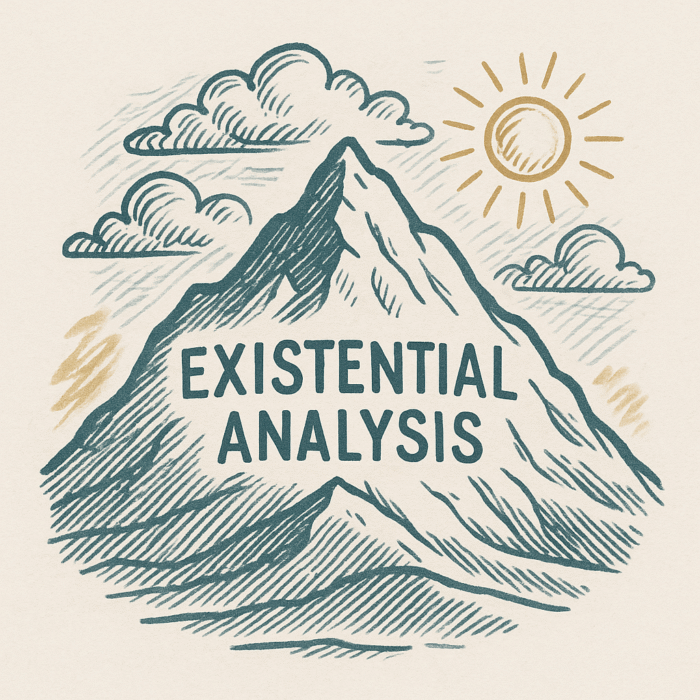Life often brings us moments when we pause and ask: What is the point of all this? Am I truly living the life I want? Why do I feel disconnected, even when everything seems fine on the outside?
These questions sit at the heart of Existential Analysis (EA) – a therapeutic and philosophical framework that helps us explore meaning, authenticity, and the freedom to shape our lives.
In this article, we’ll explore the roots of Existential Analysis, how it builds on the pioneering work of Viktor Frankl, the practical contributions of Professor Alfried Längle, and how EA can guide us today.
We’ll also introduce resources, training, and tools for therapists, coaches, and individuals who want to integrate EA into their work and daily lives.
The Origins: Viktor Frankl and Logotherapy
Existential Analysis grew out of Logotherapy, founded by Austrian neurologist and psychiatrist Viktor Frankl.
Frankl’s life story is extraordinary. A Holocaust survivor, he wrote the influential book Man’s Search for Meaning, where he described how having a sense of purpose helped him and others endure even the most unimaginable suffering.
At its core, Logotherapy teaches that:
- Human beings are motivated by a will to meaning, not just pleasure or power.
- Even in the face of suffering, we can find meaning through choice, values, and responsibility.
- Life poses questions to us – and our task is to respond authentically.
👉 If you’d like to explore training in Logotherapy, you can learn more at the Viktor Frankl Institute and Viktor Frankl Ireland.
Alfried Längle and the Development of Existential Analysis
While Frankl laid the foundation, Austrian psychiatrist Professor Alfried Längle expanded Logotherapy into a more comprehensive therapeutic method known as Existential Analysis (EA).
Längle worked closely with Frankl and later developed EA into a psychotherapy of the person, focusing not only on meaning but also on:
- Authenticity – living in line with who we really are.
- Freedom and responsibility – recognising our ability to choose and shape our lives.
- Biographical reflection – understanding how our past shapes us and how we want to move forward.
- Emotional experience – tuning into our inner world, not just rational thought.
EA is now practiced globally by psychotherapists and coaches, and it’s recognised as a deeply human and practical framework for modern challenges.
Learn more about Professor Längle here.
Training in EA is available through GLE UK.
The Four Fundamental Motivations in Existential Analysis
One of the unique contributions of Längle is the Four Fundamental Existential Motivations (FMs) – the essential conditions for a fulfilled life.
- The World (Space & Support) – Do I have enough space, security, and support to exist?
- Life (Values & Enjoyment) – Do I allow myself to experience life fully and find value in it?
- Self (Authenticity) – Am I permitted to be myself? Can I say “yes” to who I am?
- Meaning (Purpose) – For what greater reason am I living? What meaning does my life hold?
When one of these areas is unfulfilled, we often experience anxiety, emptiness, or dissatisfaction. EA provides a reflective map to notice where we are struggling and how to realign with what truly matters.

Existential Analysis in Practice
In therapy or coaching, EA is not abstract philosophy – it’s practical.
Some ways EA is applied include:
- Helping someone who feels “I don’t fit in anywhere” explore whether they are living authentically or simply conforming.
- Supporting people facing burnout or loneliness by exploring deeper needs for connection and meaning.
- Guiding individuals through life transitions (career changes, loss, or crises) by reconnecting with values and purpose.
- Encouraging everyday reflection, like asking: What does this choice mean to me? Does it align with who I want to be?
If you’d like to explore EA in an interactive way, our Mountain Framework Course brings these ideas into a practical tool for daily reflection.
How EA Differs from Other Approaches
Unlike purely cognitive approaches, EA is not just about changing thoughts.
Unlike purely behavioral approaches, it’s not just about actions.
Instead, it integrates the whole person – thoughts, feelings, body, and values. It asks:
- What does life mean to you right now?
- How can you live in alignment with your values?
- What choices are truly yours?
This makes EA especially powerful for those who struggle with:
- Depression (where life feels empty or meaningless).
- Anxiety (where freedom feels overwhelming).
- Life crises (divorce, bereavement, career changes).
Logotherapy and EA Together
Logotherapy and EA complement each other beautifully.
- Logotherapy focuses on the search for meaning, especially in suffering.
- EA adds depth, exploring freedom, authenticity, and relational life.
Both share a conviction: that life always has potential meaning, and that human beings are capable of growth and responsibility, even in hardship.
To explore Logotherapy training, visit Viktor Frankl Institute or Viktor Frankl Ireland.
Free and Practical Resources
At Meaningful Paths, we bring these profound insights into practical tools for daily life.
- 📲 Free Membership & Resources – courses, podcasts, and reflective practices.
- 📘 Quest for Meaning: 10 Exercises on Purpose – our ebook written by Psychologist Sandy ElChaar, offering reflective exercises to explore purpose.
- 🎓 Training & Courses – Mountain Model Framework for applying EA in coaching, therapy, or personal growth.
- 💬 Therapy – book a call with Sandy ElChaar, a Psychologist and Existential Analyst.
How Existential Analysis Can Help You
- Therapists & Coaches – integrate EA into practice to help clients explore values, purpose, and authenticity.
- Individuals – use EA as a reflective tool to live with more clarity and meaning.
- Communities – apply EA to foster dialogue, resilience, and leadership that is value-driven.
Conclusion: Why EA Matters Today
We live in a world full of noise, pressure, and distraction. Many people search for quick fixes, but what we often long for is something deeper – a life that feels authentic, meaningful, and aligned with who we are.
Existential Analysis offers a gentle yet powerful way to explore these questions. It doesn’t give ready-made answers but invites us into dialogue with ourselves, others, and life itself.
At Meaningful Paths, we believe that everyone deserves access to these tools. Whether through our free resources, courses, or ebooks, our mission is to make existential wisdom practical, modern, and accessible.
Start your journey today with our free resources or dive deeper into practice with our ebook: Quest for Meaning: 10 Exercises on Purpose.
Quick Notes
If you are a therapist, coach, or practitioner curious about integrating meaning-centred work into your practice, discover our My Path (For Therapists & Coaches) page designed to support your professional growth and client impact.
→ https://www.meaningfulpaths.com/my-path-therapists-coaches/
Existential Analysis is a psychotherapeutic and philosophical approach that helps individuals live with authenticity, freedom, and inner consent. Developed by Viktor Frankl and expanded by Alfried Längle, it explores how people find meaning in their experiences and make values-based decisions.
At its heart, Existential Analysis strengthens the personal relationship with life — helping people say “yes” to existence through greater awareness, responsibility, and connection.
→ Learn more about how Existential Analysis shapes the Meaningful Paths Framework
Explore Our Framework
References
- Frankl, V. E. (2006). Man’s Search for Meaning. Beacon Press. (Original work published 1946).
- Längle, A. (2011). The search for meaning in life and the existential fundamental motivations. Existential Analysis, 22(1), 25–40.
- Längle, A. (2020–2021). The Fundamental Motivations – Student Manuals. GLE-International.
- Batthyany, A., & Russo-Netzer, P. (Eds.). (2014). Meaning in Positive and Existential Psychology. Springer.
- Viktor Frankl Institute. https://www.viktorfranklinstitute.org/
- Viktor Frankl Ireland. https://viktorfranklireland.com/
- GLE UK – Existential Analysis Training

